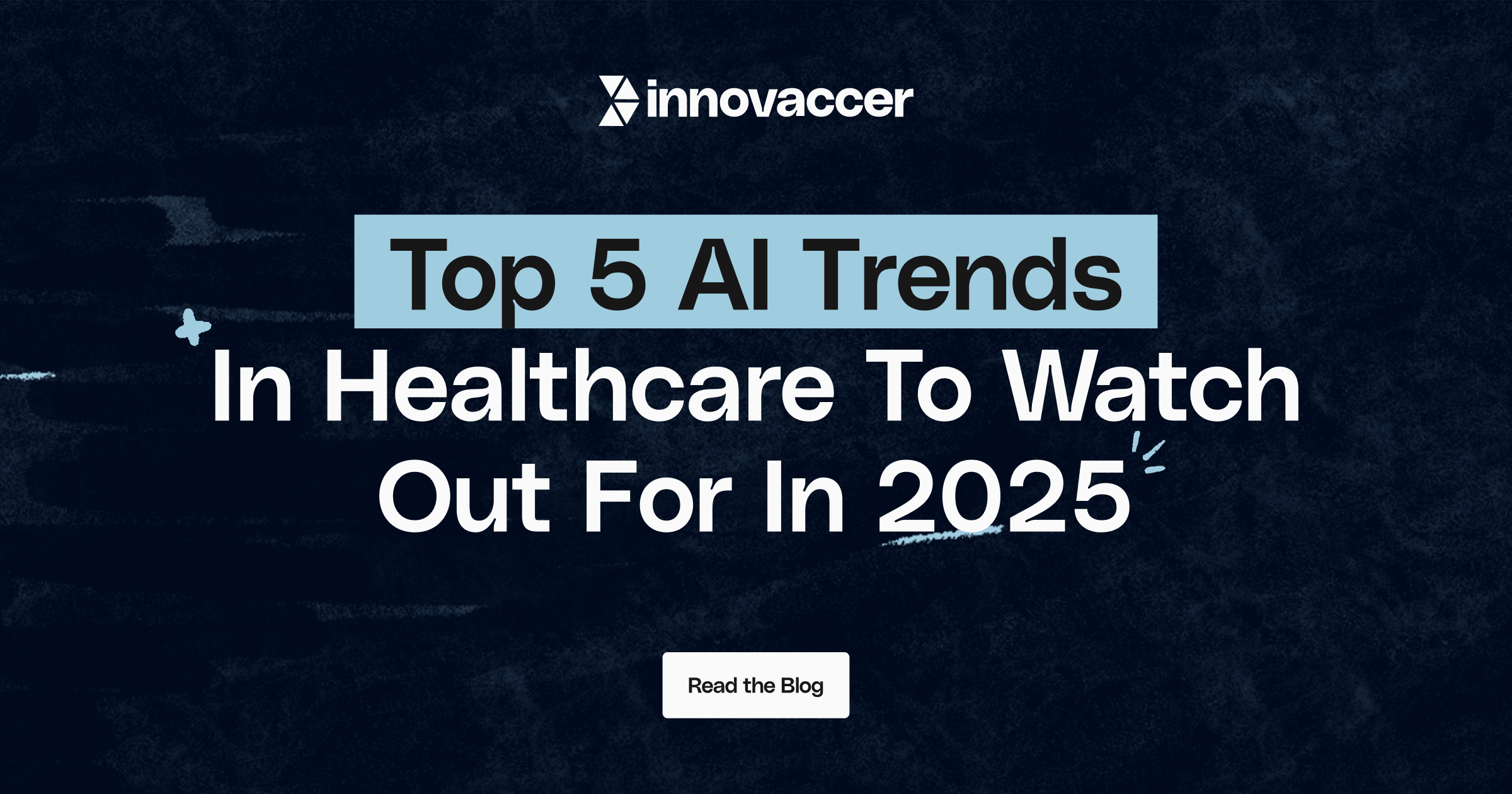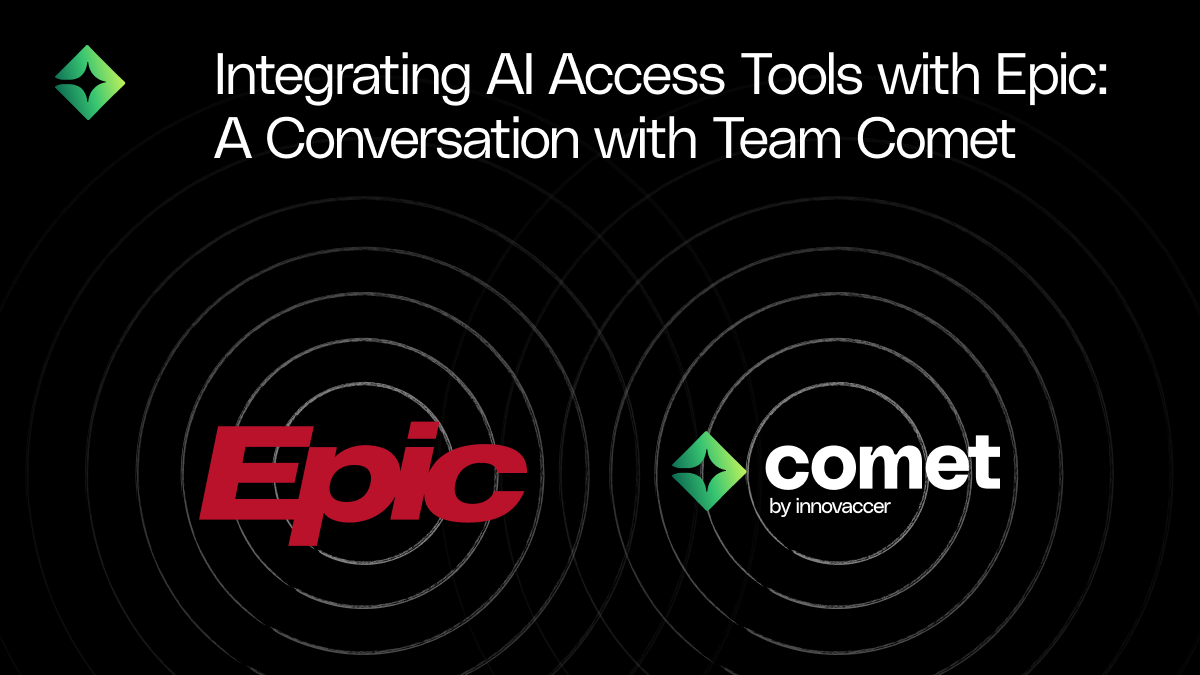Top 5 AI Trends In Healthcare To Watch Out For In 2025


When it comes to healthcare, what do you imagine as an ideal scenario? Imagine a healthcare system where patient records are instantly accessible, early disease detection is possible through comprehensive patient histories, diagnoses are more accurate, workflows run smoothly, and providers can focus on what truly matters - patient care. This would be almost perfect for patients, doctors, and every stakeholder involved in the care journey, but it is not as simple as it seems. Today's healthcare providers face familiar challenges - building patient trust, managing complex medical records, and responding swiftly to emergencies.
But here's where things get exciting. As we step into 2025, artificial intelligence is stepping in as a powerful ally, not to replace the human touch in healthcare, but to enhance it. A recent report by Vention Teams states that by 2025, 90% of hospitals will use AI technology for early diagnosis and remote monitoring. From streamlining time-consuming administrative tasks to offering unprecedented insights into patient data, AI is helping create a healthcare ecosystem where both providers and patients can thrive.
Here’s what the 100+ healthcare professionals in our survey reveal about these upcoming trends:
Rise of Automated Clinical Documentation
Think about your doctor for a moment. They need to know your complete health story - every past illness, every medication, every allergic reaction. But here's the challenge: all that information is scattered across different records, and someone needs to piece it all together. While organizing and connecting these medical records is overwhelming for doctors working manually, we all know the value such information holds for proper diagnosis. The answer to this? Automated documentation.

The rise of automated documentation of patient data through speech-to-text tools is enabling doctors to record every bit of information gathered during their visits and include it in their patient records properly. Not believable? Check our stats: Our survey shows that doctors are spending 64.76% less time on paperwork, which isn't just about convenience - it's led to a 37.1% improvement in making the right medical decisions. Imagine giving doctors back more than two hours every day to focus on what they do best: taking care of patients. When smart systems handle these behind-the-scenes tasks, your doctor can focus on what really matters - you.
Advancement in Precision Medicine
Imagine trying to solve a puzzle where some pieces are right in front of you, but others are hidden in different boxes. The actual question is not "how do we get that data" but "how do we use that data." That's what doctors face when diagnosing patients - they need to connect current symptoms with past medical histories, genetic information, and lifestyle factors to develop truly personalized treatment plans.

Now, with tools that help analyze this complex web of information, healthcare is becoming more precise and personalized than ever. The results speak for themselves: our survey shows doctors achieving 41.90% greater accuracy in their diagnoses, while treatment effectiveness has jumped by 37.5% year over year. These aren't just numbers - they represent a fundamental shift toward precision medicine, where treatments are tailored to each patient's unique profile, catching potential complications before they become serious problems. To know more about these insights, you can subscribe to our newsletter.
Building Trust in Intelligent Clinical Support
Let's be honest - we can't adapt to change easily, especially in healthcare, where every decision impacts the life of a real person. Many doctors initially wondered if they could trust intelligent support systems with any part of patient care. After all, it's one thing for AI tools to exist, but it's another to actually welcome them into the daily rhythm of hospital life. But here's what's fascinating: seeing these tools in action has completely shifted the conversation. Our research shows that 81.63% of physicians are now enthusiastic about using intelligent assistance in patient care.

What changed their minds? Hospitals are reporting a 38.1% improvement in completing administrative tasks and a 29.5% reduction in time spent on routine work. This isn't about replacing the irreplaceable human touch in healthcare - it's about giving medical professionals more time to provide it. When intelligent systems handle the time-consuming background work, doctors can focus on what truly matters: connecting with patients and providing the kind of care that only humans can deliver.
Smart Administrative Systems Enabling Active Patient Participation
Think about the last time you visited a doctor. Sure, we've talked about how doctors feel about new technology, but what about you - the person sitting in that exam room? While there's amazing tech working behind the scenes - recording your conversations, organizing your medical history, and creating detailed health charts - none of that matters if you don't feel comfortable with it. It's like having the world's best GPS - it's only helpful if you actually trust it to get you where you need to go.

Here's what's exciting though - we're starting to see that trust grow in practical ways. From chatbots making appointment scheduling as easy as texting a friend, to AI assistants helping with surgery preparations through friendly reminders. The results speak for themselves: medical records are being managed 47.61% more efficiently, doctors are spending nearly 47% more time with patients, and satisfaction rates have increased by 80%. It's not just about having better technology - it's about having technology that makes healthcare feel more human.
Data Security Meeting Scalability
Think about all the medical data flowing through our healthcare system today - while technology helps us gather and analyze it all, let's remember what we're really dealing with: these aren't just numbers and charts, they're details about real people's health and lives. Our patients trust us with their most personal information, so we've got to get this right.

The trick is finding that sweet spot: keeping everything secure while making sure doctors and nurses can quickly access what they need to provide great care. That's where today's healthcare systems shine, with serious security built in - we're talking HIPAA compliance, strong encryption, and security teams watching 24/7. These tools help thousands of doctors keep track of their patients' records across different hospitals without compromising privacy, and when a doctor needs to check your history or an insurance company needs to process a claim, they can access exactly what they need, when they need it - all while keeping your private information safe. It's like having a super-secure filing system that connects everyone in healthcare who needs to work together to take care of you.
Looking Ahead
Looking ahead to 2025, the healthcare landscape continues to evolve with a clear focus on what matters most: enhancing the connection between doctors and patients. As technology takes on more administrative burdens, healthcare providers can dedicate more time to understanding and treating their patients. These advances in medical technology aren't replacing personal interactions – they're creating more opportunities for meaningful ones. The future of healthcare puts the human experience first, making quality care more accessible and personalized while ensuring patient data remains secure and private.
Footnote: The insights mentioned in the blog are from an upcoming survey by Innovaccer. To check out our 2024 State of AI report, click here.


.png)






.avif)









.svg)
.svg)

.svg)

